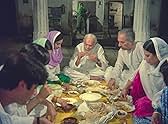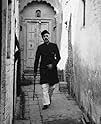Ajouter une intrigue dans votre langueIn post-partition India, a Muslim businessman and his family struggle for their rights in a country which was once their own.In post-partition India, a Muslim businessman and his family struggle for their rights in a country which was once their own.In post-partition India, a Muslim businessman and his family struggle for their rights in a country which was once their own.
- Réalisation
- Scénario
- Casting principal
- Récompenses
- 4 victoires et 4 nominations au total
Avis à la une
All those involved with this movie have done a service to Indian people, who are interested in history, partition, Hindu-Muslim relations etc. It does not matter whether this movie was declared hit, semi-hit or average, but it has left an incredible mark on one's psyche. It moves oneself to see those Muslim people who chose to stay behind in India, with their plight and dilemma. It definitely plays a big role to arouse sympathy and a soft corner for Muslim brethren who chose to stay in India, despite all the odds against them. All those associated with the story like Ismat Chugtai, Kaifi Azmi & Shama Zaidi have given an unbiased portrayal of that time. The story seemed to be too real. One loves to see the Muslim family in the movie sitting together and having their meals, where everybody participates in the discussion of the circumstances. Like the story, acting was natural all across the board, the only regret being, one expected some memorable songs, at least one or two, which were not there. Music is like dessert to an Asian mind, which adds to the lasting taste of the meal. With good music, this movie might have been declared a commercial hit too.
I saw this movie many years ago...and although so many years have passed this movie still remains etched in my mind.It was MS Sathyu's debut film as director. But he has till date not made a better film. To say that Garam Hawa is one of the most poignant and moving films ever made on the Partition is merely stating the obvious. Directors like Ritwick Ghatak had also earlier dealt with the Partition of Bengal. But Garam Hawa, made in 1973, marked the first time that a Hindi film director had handled the subject with so much sensitivity and realism.
I went to the market to purchase a DVD copy. But alas!!..It was not available in the Indian market. It is such a sad situation that being a Indian movie it is not available in India!!!...if anyone who reads this and has any knowledge as to the address where i can buy a copy IN India please email me at the foll address vinamra88@yahoo.com.I shall be ever grateful.
I went to the market to purchase a DVD copy. But alas!!..It was not available in the Indian market. It is such a sad situation that being a Indian movie it is not available in India!!!...if anyone who reads this and has any knowledge as to the address where i can buy a copy IN India please email me at the foll address vinamra88@yahoo.com.I shall be ever grateful.
Based on an unpublished story by famous Urdu writer Ismat Chugtai, is one of the few movies dealing with state of Muslims who stayed back in India post partition. This film captures the struggle and anguish of the Muslim people who found themselves in strange situation where they in their own country were treated as outsiders. Salim Mirza, played brilliantly by Balraj Sahney, is one such Muslim who stays back in India. He with his family has to fight to find their identity and respect in this new country with changed realities. He can only watch as his world is slowly ripped by tragic aftermath of partition. Sikandar, played by Farooq Shaikh, is Salim Mirza's unemployed son who is often on his face told that he might have a better chance in Pakistan. The fabulous story, great performances (especially of Balraj Sahani) and the sensitivity of the content makes it a must watch. Garam Hawa was initially banned but eventually it won a national award for national integration and was even screened in Pakistan.
The partition not only affected those who were displaced but also those who decided to stay back. And the minorities who decided to stay back amongst the majorities found themselves in a strange situation; suddenly they were outsiders in their own country and people viewed them with suspicion. 'Garam Hawa' deals with such issues with great sensitivity and perhaps is one of the best movies ever made on post partition.
Salim Mirza, brilliantly played by Balraj Sahney, is one such Muslim who stays back in India. India is a new democracy and has its problems of poverty and unemployment and Salim Mirza and his family has to fight to find its identity and respect in the country they chose not to leave. Sikandar, played by Farooq Shaikh, is Salim Mirza's unemployed son who is often told on his face that he might have a better chance in Pakistan but like his father he is determined. The family suffers a great deal for its decision but doesn't give up. I am sure everyone who was present during those days can identify with something in this story.
The grandmother wanting to die in her ancestral home and her whole life flashing before her eyes before she dies is an unforgettable scene.
Salim Mirza, brilliantly played by Balraj Sahney, is one such Muslim who stays back in India. India is a new democracy and has its problems of poverty and unemployment and Salim Mirza and his family has to fight to find its identity and respect in the country they chose not to leave. Sikandar, played by Farooq Shaikh, is Salim Mirza's unemployed son who is often told on his face that he might have a better chance in Pakistan but like his father he is determined. The family suffers a great deal for its decision but doesn't give up. I am sure everyone who was present during those days can identify with something in this story.
The grandmother wanting to die in her ancestral home and her whole life flashing before her eyes before she dies is an unforgettable scene.
One of the best movies made on the most debated subject in South Asia - the Partition!. It portrays life of a Muslim family in post-partition India. The family elder fights the temptations to move out to the newly-formed country called 'Pakistan' and the family faces the challenges that come on their way. Most of the clues and warnings set out at the outset manifested themselves in the latter years and decades and still continue to haunt both sides of the border.
Balraj Sahni has carried it through. A. K. Hangal and Gita Siddharth (Kak) were superb. Farooq Shaikh can be seen in his early years of act.
The land is divided, Lives are shattered Storms rage in every heart; It's the same here or there Faith has lost all meaning; Here or there.
Balraj Sahni has carried it through. A. K. Hangal and Gita Siddharth (Kak) were superb. Farooq Shaikh can be seen in his early years of act.
The land is divided, Lives are shattered Storms rage in every heart; It's the same here or there Faith has lost all meaning; Here or there.
Le saviez-vous
- AnecdotesBalraj Sahni passed away just after finishing the dubbing of the film. His own daughter had died at a young age and there is a touching scene in the film where Salim Mirza's daughter commits suicide. His expressions are as real as they can be, in the scene when he finds her dead and in the next scene, is at her funeral. It was one of his best performances and his presence added a lot of class, grace and lifted the film to great heights. The effort and passion of the unit was rewarded by having him as the lead actor.
- ConnexionsFeatured in Mammo (1994)
Meilleurs choix
Connectez-vous pour évaluer et suivre la liste de favoris afin de recevoir des recommandations personnalisées
- How long is Garm Hava?Alimenté par Alexa
Détails
- Date de sortie
- Pays d’origine
- Langues
- Aussi connu sous le nom de
- Горячие ветра
- Lieux de tournage
- Agra, Uttar Pradesh, Inde(Mirza family's residential city)
- Sociétés de production
- Voir plus de crédits d'entreprise sur IMDbPro
Contribuer à cette page
Suggérer une modification ou ajouter du contenu manquant























